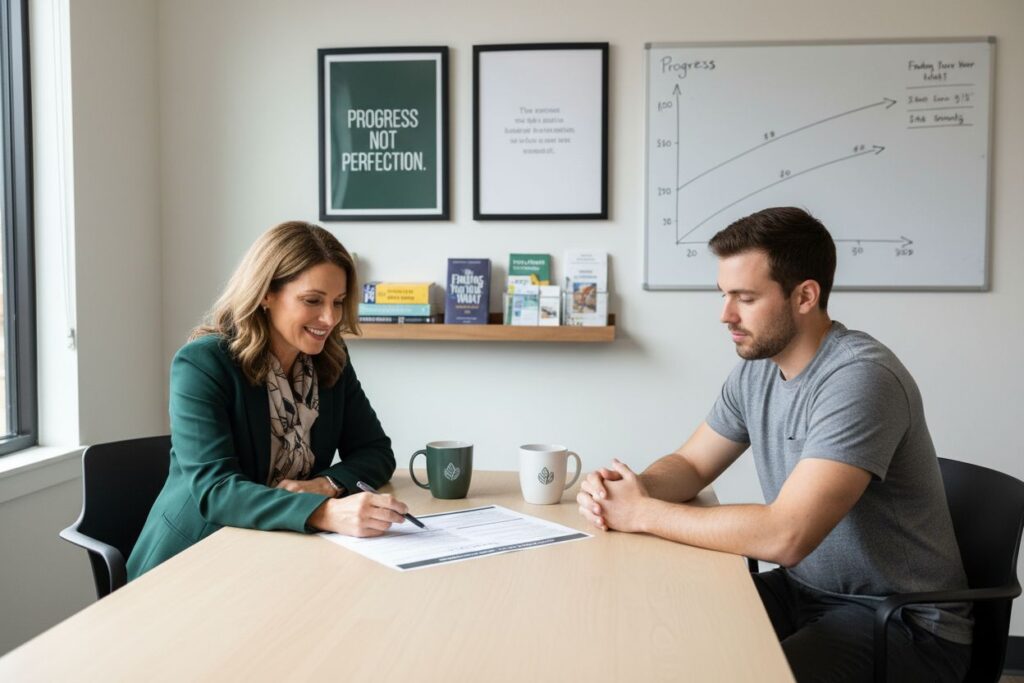Nearly 21 million Americans struggle with addiction every year, but only about 10 percent receive treatment that truly fits their needs. Finding a clear path forward can feel overwhelming when every recovery journey is unique and personal. Understanding the framework behind recovery plans helps people regain control, set realistic goals, and build a foundation that leads to lasting change and renewed confidence.
Key Takeaways
| Point | Details |
|---|---|
| Personalized Recovery Plans | Recovery plans are tailored roadmaps that provide structure, accountability, and guidance for individuals overcoming substance use disorders. |
| Key Components for Success | Essential elements include identifying motivations, recognizing triggers, developing coping mechanisms, and establishing support networks. |
| Types of Recovery Plans | Different recovery plans cater to various needs, with options such as medical detox, residential treatment, and peer-driven programs. |
| Avoiding Common Pitfalls | Key mistakes include overconfidence, neglecting aftercare, and isolating from support; maintaining ongoing engagement with support systems is crucial for long-term success. |
Table of Contents
- Defining A Recovery Plan In Addiction Treatment
- Types Of Recovery Plans And Their Differences
- Key Elements Of An Effective Recovery Plan
- Steps For Creating A Personalized Recovery Plan
- Common Mistakes And How To Avoid Them
Defining a Recovery Plan in Addiction Treatment
A recovery plan is a personalized roadmap that guides individuals through their journey of healing from substance use disorders, providing structure, accountability, and hope. According to research from the U.S. Department of Health and Human Services, this blueprint helps individuals track progress, identify potential triggers, and outline specific steps toward achieving sustainable wellness.
The core purpose of a recovery plan is to transform abstract goals into concrete, actionable strategies. Key components typically include:
- Identifying personal motivations for recovery
- Recognizing potential triggers and high-risk situations
- Developing coping mechanisms and stress management techniques
- Establishing measurable, realistic short and long-term goals
- Creating a support network strategy
As outlined in the Wellness Recovery Action Plan (WRAP), which is listed in SAMHSA’s National Registry of Evidence-Based Programs and Practices, an effective recovery plan emphasizes a strengths-based, trauma-informed approach. This means the plan isn’t just about avoiding substance use, but about empowering individuals to build a fulfilling life aligned with their personal values and aspirations.
For those ready to begin their recovery journey, creating a comprehensive recovery plan requires professional guidance and support. Each plan is uniquely crafted to address individual challenges, ensuring a personalized pathway toward sustainable healing and personal transformation.
Types of Recovery Plans and Their Differences
Addiction recovery isn’t a one-size-fits-all approach. Recovery plans vary widely, each designed to address different needs, severity levels, and individual circumstances. According to research from national addiction resources, multiple recovery program types exist, each offering unique therapeutic strategies and levels of support.
The primary types of recovery plans include:
Here’s a comparison of the primary types of recovery plans and their unique characteristics:
| Recovery Plan Type | Core Focus | Level of Support |
|---|---|---|
| Medical Detox | Withdrawal management | High (24/7 medical) |
| Residential Treatment | Intensive recovery Structured care |
Very High (live-in) |
| MAT (Medication-Assisted) | Medication + counseling | Moderate to High |
| Intensive Outpatient (IOP) | Flexible treatment Daily life integration |
Moderate |
| Dual Diagnosis Care | Substance + mental health | High (multidisciplinary) |
| Behavioral Therapy | Psychological transformation | Varies (individual/group) |
| Peer-Driven (12-Step) | Community and accountability | Variable (peer support) |
- Medical Detox Programs: Medically supervised withdrawal management
- Residential Treatment: 24/7 structured environment for intensive recovery
- Medication-Assisted Treatment (MAT): Combining medications with counseling
- Intensive Outpatient Programs (IOPs): Flexible treatment allowing daily life maintenance
- Dual Diagnosis Care: Addressing co-occurring mental health disorders
- Behavioral Therapy Programs: Focused on psychological transformation
As highlighted by research on twelve-step programs, peer-driven recovery frameworks offer another distinctive approach.

Learn more about our personalized recovery approaches at Glendora Recovery Center, where we customize treatment plans to match your unique recovery needs and personal circumstances.
Key Elements of an Effective Recovery Plan
Building a successful recovery plan requires careful consideration of multiple interconnected components that address the complex nature of addiction and personal healing. According to research from addiction recovery experts, an effective plan goes far beyond simply avoiding substances – it’s a holistic approach to transforming one’s entire life trajectory.
Key elements of a comprehensive recovery plan typically include:
- Personal Trigger Identification: Mapping out specific situations, emotions, or environments that might provoke substance use
- Coping Strategy Development: Creating targeted techniques for managing stress, anxiety, and challenging emotional states
- Self-Care Routines: Establishing healthy sleep patterns, nutritional strategies, and physical wellness practices
- Support Network Creation: Building a reliable system of personal and professional support
- Relapse Prevention Mechanisms: Developing specific tools and backup plans to maintain long-term sobriety
Research highlights that effective recovery plans incorporate both practical strategies and emotional wellness techniques. As noted by addiction recovery resources, this means integrating stress management tools like journaling, exercise, and creative outlets alongside concrete goals that provide direction and motivation.
Learn more about developing a personalized aftercare plan that addresses your unique recovery journey and supports sustainable healing.
Steps for Creating a Personalized Recovery Plan
Creating a personalized recovery plan is a transformative journey that requires honest self-reflection, strategic planning, and committed action. According to addiction recovery research, developing an effective plan involves a comprehensive, step-by-step approach that addresses the unique complexities of individual recovery experiences.
The key steps for creating a personalized recovery plan include:
- Comprehensive Self-Assessment
- Evaluate substance use patterns
- Identify personal triggers and emotional challenges
- Assess current physical and mental health status
- Examine existing social support systems
- Goal Setting
- Develop SMART goals (Specific, Measurable, Achievable, Relevant, Time-bound)
- Create short-term and long-term recovery objectives
- Define measurable milestones for personal growth
- Treatment Strategy Selection
- Choose appropriate treatment modalities
- Consider inpatient or outpatient options
- Select suitable therapeutic approaches
- Explore medication-assisted treatment if recommended
Research emphasizes that successful recovery plans require deep personal commitment and a willingness to address underlying motivations and potential barriers to change. By carefully assessing readiness and developing targeted strategies, individuals can create a roadmap that supports sustainable healing and personal transformation.
Learn more about our addiction recovery process and how we can help you develop a personalized plan tailored to your unique journey.
Common Mistakes and How to Avoid Them
Recovery is a challenging journey filled with potential obstacles that can derail progress. Addiction recovery requires ongoing vigilance and self-awareness to navigate the complex path of healing and personal transformation. According to addiction recovery research, recognizing and proactively addressing common pitfalls is crucial for maintaining long-term sobriety.
Key mistakes to watch out for include:
- Overconfidence in Sobriety: Believing you’re completely immune to relapse
- Neglecting Aftercare: Stopping treatment or support programs prematurely
- Isolating from Support Networks: Withdrawing from healthy relationships and support systems
- Underestimating Triggers: Failing to develop comprehensive strategies for managing high-risk situations
- Discontinuing Therapy: Ending professional mental health support too soon
Research highlights several critical strategies for avoiding these common recovery pitfalls. Maintaining humility, setting realistic expectations, and committed engagement with ongoing support are essential. This means continuing therapy, staying connected with support groups, regularly reassessing your recovery plan, and being honest about challenges.
Explore our guide on how aftercare programs foster recovery and independence to build a sustainable, long-term approach to healing and personal growth.
Ready to Turn Your Recovery Plan Into Real Progress?
Building an effective recovery plan takes courage and clarity. As shared in this article, many people struggle with turning self-assessments and goal setting into daily habits that truly last. Common pain points include managing emotional triggers, finding the right support, and preventing relapse during tough times. If you have been trying to create a personalized plan for sobriety and mental wellness but do not know where to start, you are not alone.
At Glendora Recovery Center, we turn hope into action. Our individualized treatment programs offer exactly what this article emphasizes: professional guidance, compassionate support, and proven strategies for lasting change. Whether you need intensive outpatient care, ongoing aftercare, or dual diagnosis solutions, our experienced team is here to help you take the next step. Do not wait for tomorrow to address these challenges. Connect with us today to start building your own recovery plan or learn about our process with our caring specialists. Your personalized journey to lasting health begins with a single conversation.
Frequently Asked Questions
What is a recovery plan in addiction treatment?
A recovery plan is a personalized roadmap designed to guide individuals through their healing journey from substance use disorders. It includes goals, coping strategies, and support networks to help achieve sustainable wellness.
What are the key components of an effective recovery plan?
An effective recovery plan typically includes personal trigger identification, coping strategy development, self-care routines, a support network, and relapse prevention mechanisms tailored to an individual’s needs.
How do I create a personalized recovery plan?
To create a personalized recovery plan, you should conduct a comprehensive self-assessment, set SMART goals, and select appropriate treatment strategies that address your unique challenges and objectives.
What are some common mistakes to avoid when following a recovery plan?
Common mistakes include overconfidence in sobriety, neglecting aftercare, isolating from support networks, underestimating triggers, and discontinuing therapy prematurely. Staying connected and regularly reassessing your plan are essential for long-term success.
Recommended
- Aftercare Plan After Addiction Treatment: What Is It & Its Advantages
- Addiction Recovery Center: Everything You Should Know
- Mistakes To Avoid While Visiting An Addiction Recovery Center
- Addiction Recovery Process 2025: Complete Guide | Glendora Recovery Center
- Understanding What is Emergency Evacuation and Its Importance




